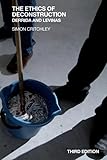The Ethics of Deconstruction : Derrida and Levinas / Simon Critchley.
Material type: TextPublisher: Edinburgh : Edinburgh University Press, [2022]Copyright date: ©2014Description: 1 online resource (352 p.)Content type:
TextPublisher: Edinburgh : Edinburgh University Press, [2022]Copyright date: ©2014Description: 1 online resource (352 p.)Content type: - 9780748689316
- 9780748689330
- 001.09 22
- B2430.D484 C75 2014
- online - DeGruyter
- Issued also in print.
| Item type | Current library | Call number | URL | Status | Notes | Barcode | |
|---|---|---|---|---|---|---|---|
 eBook
eBook
|
Biblioteca "Angelicum" Pont. Univ. S.Tommaso d'Aquino Nuvola online | online - DeGruyter (Browse shelf(Opens below)) | Online access | Not for loan (Accesso limitato) | Accesso per gli utenti autorizzati / Access for authorized users | (dgr)9780748689330 |
Frontmatter -- Contents -- Abbreviations -- Preface to Third Edition -- Preface to Second Edition -- Prefatory Note and Acknowledgements -- 1 The Ethics of Deconstruction: The Argument -- 2 The Problem of Closure in Derrida -- 3 Clôtural Readings I: 'Bois' - Derrida's Final Word on Levinas -- 4 Clôtural Readings II: Wholly Otherwise: Levinas's Reading of Derrida -- 5 A Question of Politics: The Future of Deconstruction -- Appendix 1 The Ethics of Deconstruction: An Attempt at Self-Criticism -- Appendix 2 Habermas and Derrida Get Married -- Appendix 3 Emmanuel Levinas -- Appendix 4 Derrida: The Reader -- Appendix 5 Leaving the Climate of Heidegger's Thinking -- Appendix 6 Five Problems in Levinas's View of Politics and the Sketch of a Solution to Them -- Index
restricted access online access with authorization star
http://purl.org/coar/access_right/c_16ec
An expanded edition of the first book to argue for the ethical turn in Derrida's workNew for this editionThis third edition contains three new texts, and a new preface where Critchley reflects upon the origins, motivation and reception of The Ethics of DeconstructionThe Ethics of Deconstruction, Simon Critchley's first book, was originally published to great acclaim in 1992. It was the first book to argue for the ethical turn in Derrida's work and to show as powerfully as possible how deconstruction has persuasive ethical consequences that are vital to our thinking through of questions of politics and democracy. Rather than being concerned with deconstruction in terms of the contradictions inherent in any text - an approach typical of the early Derrida and those in literary criticism aiming to extract a critical method for an application to literature - Critchley concerns himself with the philosophical context necessary for an understanding of the ethics of deconstructive reading. Far from being some sort of value-free nihilism or textual free-play, Critchley showed the ethical impetus that was driving Derrida's work. His claim was that Derrida's understanding of ethics has to be understood in relation to his engagement with the work of Levinas and the book lays out the details of their philosophical confrontation.
Issued also in print.
Mode of access: Internet via World Wide Web.
In English.
Description based on online resource; title from PDF title page (publisher's Web site, viewed 24. Mai 2022)


